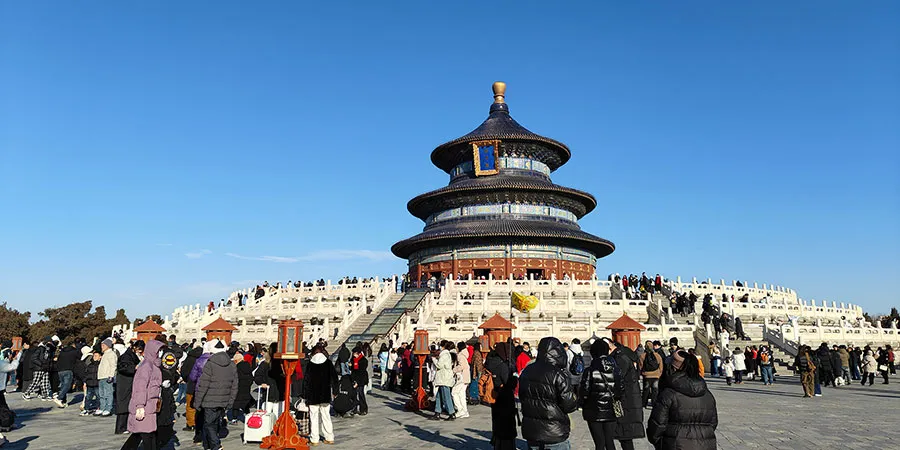Heaven Worship Culture
Starting from Emperor Yongle of the Ming Dynasty (1368-1644), every year the emperor would come to the Temple of Heaven to hold ceremonies to worship the Heaven (Ji Tian in Chinese). Especially when encountering a year of draught, the emperor would go to the Circular Mound Altar to pray for rain.
In order to safeguard the "divine right of emperor" and show the divine authority, the ancient worshipping ceremony was highly emphasized with extremely strict precepts. Any error would be severely punished. A great deal of preparation work was needed. All the roads and buildings in the Temple of Heaven had to be renewed on a large scale. Five days before the ceremony, princes demanded that all the livestock to be sacrificed during the ceremony be carefully checked; three days before the ceremony, the emperor began to fast; two days before, prayer words should be written; on the last day, livestock should be slaughtered; sacrifices should be made and the ceremonial articles should be established. On the last day, the emperor must read the prayer, give a ritual at the Imperial Vault of Heaven, watch the divine tablets at the Circular Mound Alter, check the ceremonial articles in the Divine Storeroom, see the sacrifices at the Divine Kitchen, and then go back to the Palace of Abstinence for fasting; on the eve officers must straighten out the tablets, the ceremonial articles as well as the sacrifices. Besides all this, the music should be ready. Lastly, the officials of Ritual Department would perform an overall check.
The Circular Mound Altar was dedicated to the heaven worship ceremony. The upper layer of the Heaven Heart Stone was set with the main tablet, the Tablet of Heaven Great. The eastern and western sides of the second layer had subsidiary tablets including tablets of the Gods of Sun, Moon, Stars, Cloud, Rain God, Wind and Thunder. A large number of offerings, such as jade, silk, cow, sheep, hog, wine, fruit and dishes were dedicated to the tablets. The eastern and western sides of the southern stairs of the Circular Mound Altar displayed 60 kinds of Shao music instruments, such as chimes, bells, etc. which were arranged in neat rows, solemn and magnificent.
Seven Ke (a “Ke” in the Qing Dynasty refers to 15 minutes) before sunrise was the starting time. At this moment, the Bell of Supreme Harmony in the Palace of Abstinence was sounded, the emperor started off to the Circular Mound Altar.
① Welcome the Heaven Great: The emperor first changed into worshipping clothes at the Dressing Terrace, and then headed to the Circular Mound Altar and kneeled on the middle layer of the Altar. When the ceremonial music started, the emperor kneeled down at the main tablet and then at the subsidiary tablets subsequently. Lastly, gave rituals in front of the ancestral tablets.
② Lay jade and silk: The emperor laid jades and silk in front of the tablets.
③ Offer up sacrifices: The emperor offered sacrifices in front of the tablets.
④ Give the first ritual: The emperor made the first libation to the Tablet of Heaven Great. At this time, special chapters of music and dance were played. The prayer words were read, and then the emperor kneeled three times and kowtowed for nine times before the tablet.
⑤ Give the second ritual: The emperor made a libation to the tablets for various gods. Special music and dance were performed at that time.
⑥ Give the final ritual: The emperor made a final libation to all the sacred tablets, and kneeled down for three times and bowed for nine times.
⑦ Withdraw the sacrifices: All the offerings were taken down the altar, and the “Xiping” chapter of music was played.
⑧ Sent the Heaven Great: The emperor kneeled down for three times and bowed for nine times, and then went to the Firewood Stove. All the offerings, ceremonial placards and silk scrolls were respectfully transferred to the stove and put inside to be burned.
⑨ Watch the burning: The emperor watched the burning of offerings, and then left the Temple of Heaven and went back to the Forbidden City. The ceremony was over.
The music played on the ceremony is the Zhonghe Shaoyue music which was divided into nine chapters, and the dance is the “Wugong Dance” consisting of eight independent parts. The music and dance made the ceremony grand and spectacular.
Preparation Work
 |
 |
| Circular Mound Altar |
Worshipping Site
Worshipping Time
Procedures
② Lay jade and silk: The emperor laid jades and silk in front of the tablets.
③ Offer up sacrifices: The emperor offered sacrifices in front of the tablets.
④ Give the first ritual: The emperor made the first libation to the Tablet of Heaven Great. At this time, special chapters of music and dance were played. The prayer words were read, and then the emperor kneeled three times and kowtowed for nine times before the tablet.
⑤ Give the second ritual: The emperor made a libation to the tablets for various gods. Special music and dance were performed at that time.
⑥ Give the final ritual: The emperor made a final libation to all the sacred tablets, and kneeled down for three times and bowed for nine times.
⑦ Withdraw the sacrifices: All the offerings were taken down the altar, and the “Xiping” chapter of music was played.
⑧ Sent the Heaven Great: The emperor kneeled down for three times and bowed for nine times, and then went to the Firewood Stove. All the offerings, ceremonial placards and silk scrolls were respectfully transferred to the stove and put inside to be burned.
⑨ Watch the burning: The emperor watched the burning of offerings, and then left the Temple of Heaven and went back to the Forbidden City. The ceremony was over.
Worship Music and Dance
![]() Next: FAQs on Temple of Heaven
Next: FAQs on Temple of Heaven
- Last updated on Apr. 08, 2025 by Gabby Li -